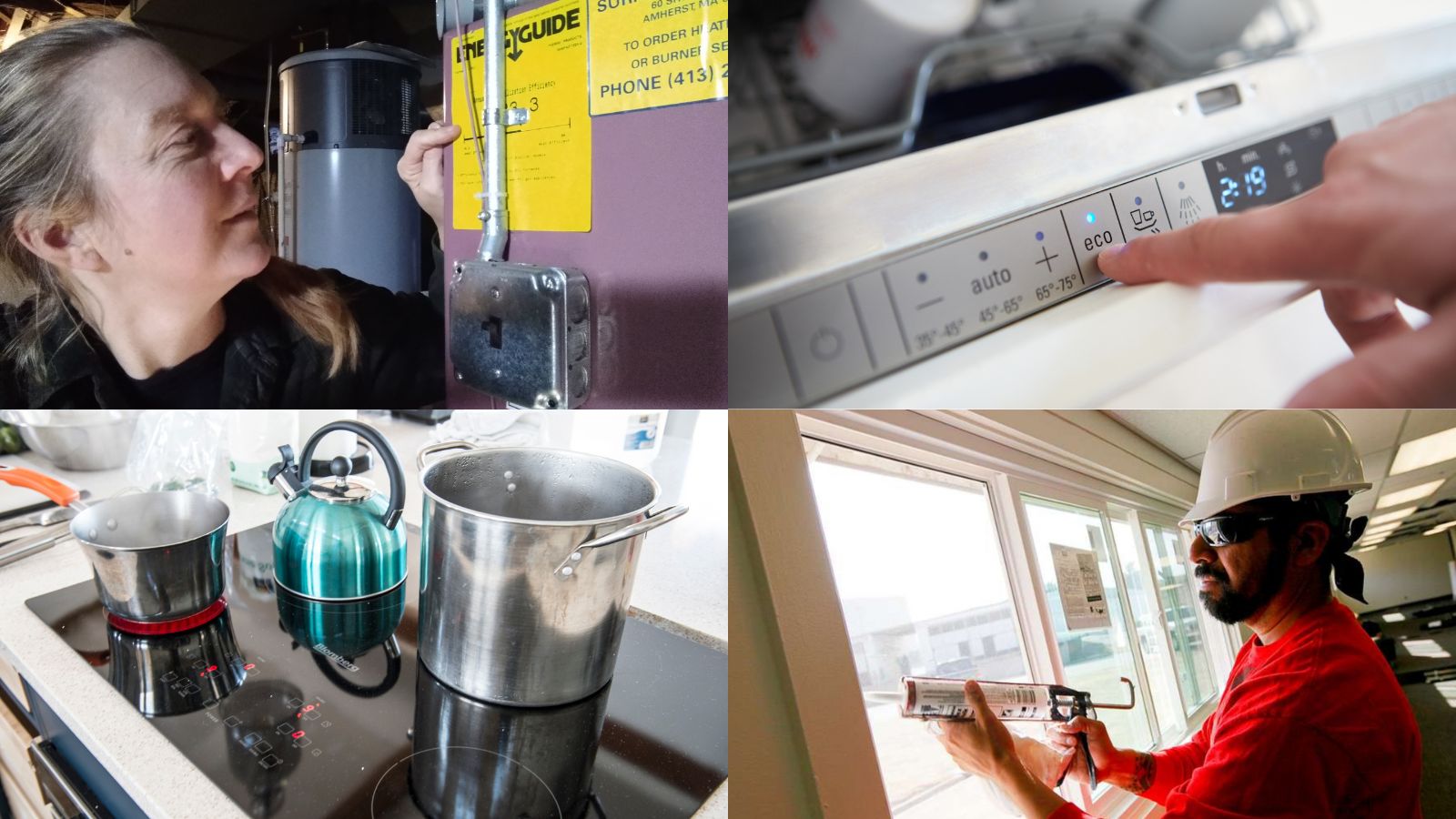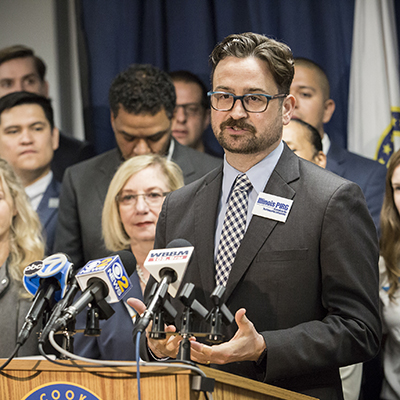
Testimony before Chicago Committee hearing on Peoples Gas’ proposed rate hike
Peoples Gas mismanaged pipe replacement program is a primary driver behind the record rate hike request. This program is behind schedule, over budget, and is not reducing safety risks.
Testimony of Abraham Scarr, Illinois PIRG Director before the City of Chicago Committee on Environmental Protection and Energy in support of R2023-0004577, Call for Hearing on Proposed Rate Hikes by Peoples Gas Company
Chairperson Hadden, Vice Chairperson Knudesen, honorable members of the Committee, thank you for the opportunity to submit written testimony in support of R2023-0004577.
Alderperson Conway, thank you for introducing this important resolution and bringing it before City Council.
My name is Abe Scarr and I am the director of Illinois PIRG. Illinois PIRG is an advocate for the public interest. We speak out for the public and stand up to special interests on problems that affect the public’s health, safety and wellbeing.
Since 2017 Illinois PIRG has watchdogged Peoples Gas and its failing pipe replacement program.
- In 2017 and 2018, we raised the alarm when a two-year Illinois Commerce Commission investigation into the pipe replacement program ended with no reforms to the troubled program.
- In 2019, we published an in-depth report highlighting chronic problems with the program and the failure of the Commission to implement necessary reforms.
- In 2020, we worked with this Committee and City Council to pass a resolution calling on state leaders to reform the pipe replacement program.
- We built a coalition of fifty organizations in a successful campaign to end the state “QIP” law that has shielded the pipe replacement program from meaningful oversight and accountability.
- We are currently a party in the Peoples Gas rate case.
While we have much to say about the proposed Peoples Gas rate hike and the many contested issues in the case, my testimony is focused on the pipe replacement program.
Summary
The Peoples Gas pipe replacement program, currently called the Safety Modernization Program or SMP, is the primary driver of its record breaking $402 million rate hike proposal. More than half of the proposed increase is due to spending on the program over the past decade, and millions more is due to proposed spending on the program in 2024.
Without reform, the program will lead to further and frequent rate hikes. The Executive Chairman of the out-of-state Peoples Gas parent company has told Wall St. analysts that they may begin filing annual rate hikes to keep up with program spending.
The pipe replacement program is also the primary driver of six consecutive years of record-breaking Peoples Gas profits, which were $208 million in 2022. Through the current rate proposal, the company’s authorized annual profits could jump to over $300 million starting next year.
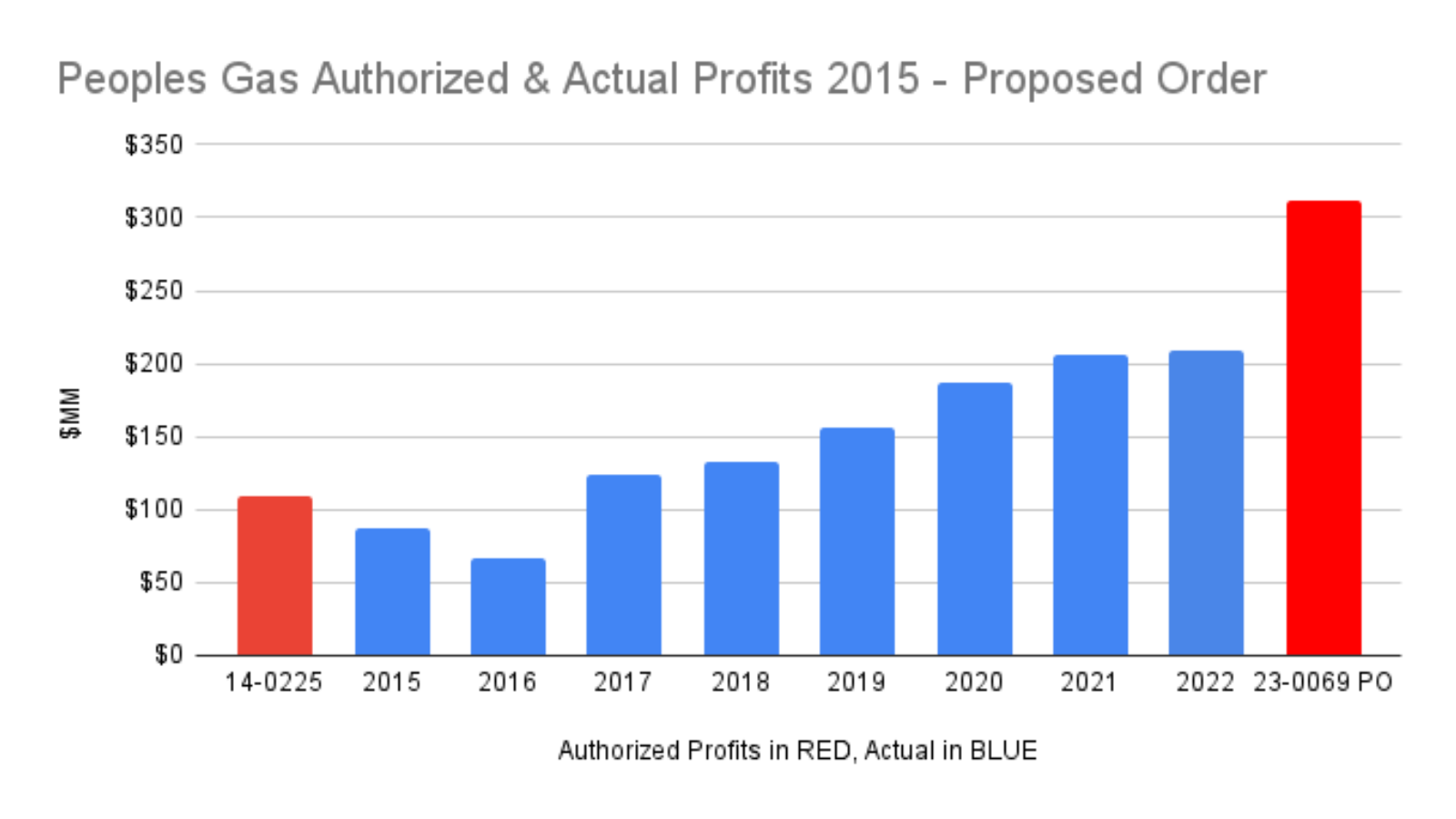
Now, these rate hikes and utility profits could potentially be justified if the underlying program was necessary and the program was effectively and efficiently managed. But that is not the case. In fact, the opposite is the case.
The Peoples Gas pipe replacement program is mismanaged, failing to effectively address safety risks in the Peoples Gas system, causing severe affordability burdens for Chicagoans, and absurd in the face of Climate change.
As others providing testimony today are speaking to affordability burdens and the clean energy transition, I will focus my testimony on the program’s management problems and failure to achieve its public safety objective.
History
Peoples Gas first identified the need for a dedicated program to accelerate replacement of at-risk pipes in the early 1980’s. A 1981 report commissioned by the company recommended a 50 year dedicated program of accelerated replacement of a subset of iron pipes at elevated risk of failure – with a target end date of 2030.
A 1988 audit found that Peoples Gas was not running such a program. Instead, the audit found, Peoples Gas replaced iron pipes largely in response to work done by third parties, primarily the City. Of the three scenarios in which the company replaced iron gas mains, the only one that was not responsive to third parties was a project whose aim was to upgrade system pressure to medium pressure.
Another management audit in 1994 made similar findings: replacement work was not driven by targeted risk reduction, but rather by City public improvements and medium pressure work.
In the early 1990s, Peoples Gas adopted a “Main Ranking Index” which used a variety of data points in order to prioritize the riskiest pipes for earliest replacement. The period that followed, from the mid-1990s through most of the 2000’s, was the most successful in reducing the risk posed by aging pipes as measured by the rate of leaks, breaks, and cracks.
In 2007, the company proposed further accelerating the program, spending more money and performing more work each year. Along with the acceleration, the company proposed changing the program’s scope and design, adding new categories of work and transitioning from a targeted pipe replacement program to a broader system overhaul to medium pressure. A significant part of that proposed change was to shift from a “segment” approach that targeted the riskiest pipes, to a “zonal” approach, that targeted broader neighborhoods, based in part on risk, but also on medium pressure considerations.
This is important. Peoples Gas did not propose to, and is not running a targeted program designed to effectively and efficiently mitigate the risks posed by aging iron pipes. Rather, it is running a broad system overhaul that incorporates, but is not focused primarily on, risk-reduction.
While the Illinois Commerce Commission rejected the 2007 proposal, it later approved a similar proposal and the newly configured accelerated program began in 2011. The program was immediately beset by management problems. Within a year, the problems were so apparent and significant that the Commission initiated a management audit. Liberty Consulting’s Phase I audit report, published in May 2015 concluded that “the management of the [SMP] falls short of good utility practice.”
Soon after, the Illinois Commerce Commission approved WEC Energy’s acquisition of Peoples Gas in June 2015 – providing an opportunity for new management to reboot and reform the program. Instead, one month after the merger was approved, new management informed the Commission that the problems with the program were more severe than it had anticipated and that it would not produce pipe replacement program transition plans on the timeline it had just agreed to as a condition to the merger. New management also informed the Commission that previous management had made material omissions of fact by failing to disclose the ballooning cost of the program to the Commission, even when the Commission directly asked them about cost estimates after the publication of the Phase I report.
When new management did eventually produce transition plans, those plans did not meet the standards set forth by auditors and were criticized as inadequate by Commission staff. A September 2015 audit implementation report raised the alarm about new management’s resistance to implementation of the 95 Phase I audit recommendations.
Faced with clearly inadequate plans, having been misled about the ballooning cost of the program, and a troubling first audit implementation report, the Commission rejected the company’s proposal and ordered a new investigation into the program.
What was initially a one year investigation extended to two years. At the end of the investigation, in January 2018, the Commission balked, claiming that the state “QIP” law tied its hands, and shielded the program from Commission action. Worse, because the investigation overlapped with the audit implementation period, some audit findings were left to be adjudicated through the investigation – only for the Commission to ultimately take no action. The overlapping processes allowed the company to get away with not responding to critical audit findings.
Finally, the investigation ordered an engineering study of the Peoples Gas system. The January 2020 engineering report did not evaluate the effectiveness of the pipe replacement program, only the condition of the pipes themselves. The report found that the program had not resulted in a noticeable reduction in pipeline failure rates and recommended that Peoples Gas retire its remaining risk prone pipe by 2030, rather than its planned 2035-2040 completion timeline. In response Peoples Gas has made no adjustments to its program design or timeline.
That, roughly, brings us to today. After the 2018 investigation ended, the program has been shielded by the Commission’s interpretation of state QIP law. That law is set to expire December 31st, 2023, which is what prompted the Peoples Gas rate proposal and the first opportunity in years to restore meaningful oversight and accountability to the program.
Peoples Gas is mismanaging the pipe replacement program
Liberty Consulting’s 2015 Phase I audit report included this topline finding:
Liberty’s year-long investigation disclosed a lack of management expression or understanding of: (a) likely overall program costs, (b) likely program duration relative to targeted completion of leak-prine pipe replacement by 2030, and (c) the reasons why leak rates have not fallen significantly after four years of accelerated replacement of cast iron and ductile iron pipes.Liberty Consulting’s 2015 Phase I audit
That is, management did not understand and could not explain how much the program would cost, how long it would take, and why it wasn’t accomplishing its primary objective. These fundamental project management problems persist.
Program costs have ballooned
When Peoples Gas first proposed an accelerated and expanded program in 2007, it estimated the total cost of the program would be $1.4 billion. When it proposed the program again in 2009, the estimated cost had grown to $2.47 billion. Between 2012 and 2015 cost estimates climbed to $4 billion and then to $8 billion. The last cost estimate, performed in late 2015, produced numerous potential estimates, including one figure as high as $11 billion.
Last year, a Crain’s journalist extrapolated program costs based on past performance and estimated an $11 billion total cost.
As the Liberty Auditors explained:
Managing a program such as the [SMP] requires current, comprehensive and reasonably accurate cost estimates at the individual project level and at the program level. The primary function of cost estimating is to provide a standard or baseline for control and for managing performance … Lack of a strong cost estimating capability creates a major impediment to effective cost management.Liberty Consulting’s 2015 Phase I audit
To date, Peoples Gas does not have an official long-term program cost estimate. Liberty found, as did the 1988 and 1994 audits, that pipe replacement efforts operated on an annual budget basis, driven not by the program’s risk reduction objective, but by available capital.
As covered in more detail below, this lack of basic project management fundamentals likely contributes to why Peoples Gas has been over budget, in terms of cost per mile of pipe retired, every year since regular reporting began in 2018.
The program does not operate on a fixed long-term schedule
Similar to reliable cost estimates, the expert auditors from Liberty recommended a fixed long-term schedule of work, through which management could track progress and evaluate performance. Instead, Peoples Gas operates off of a “rolling three year plan” which it reboots annually, and with a five year completion window from 2035-2040.
As one can see from its most recent program quarterly report, its draw-down curve clearly extends through 2040.
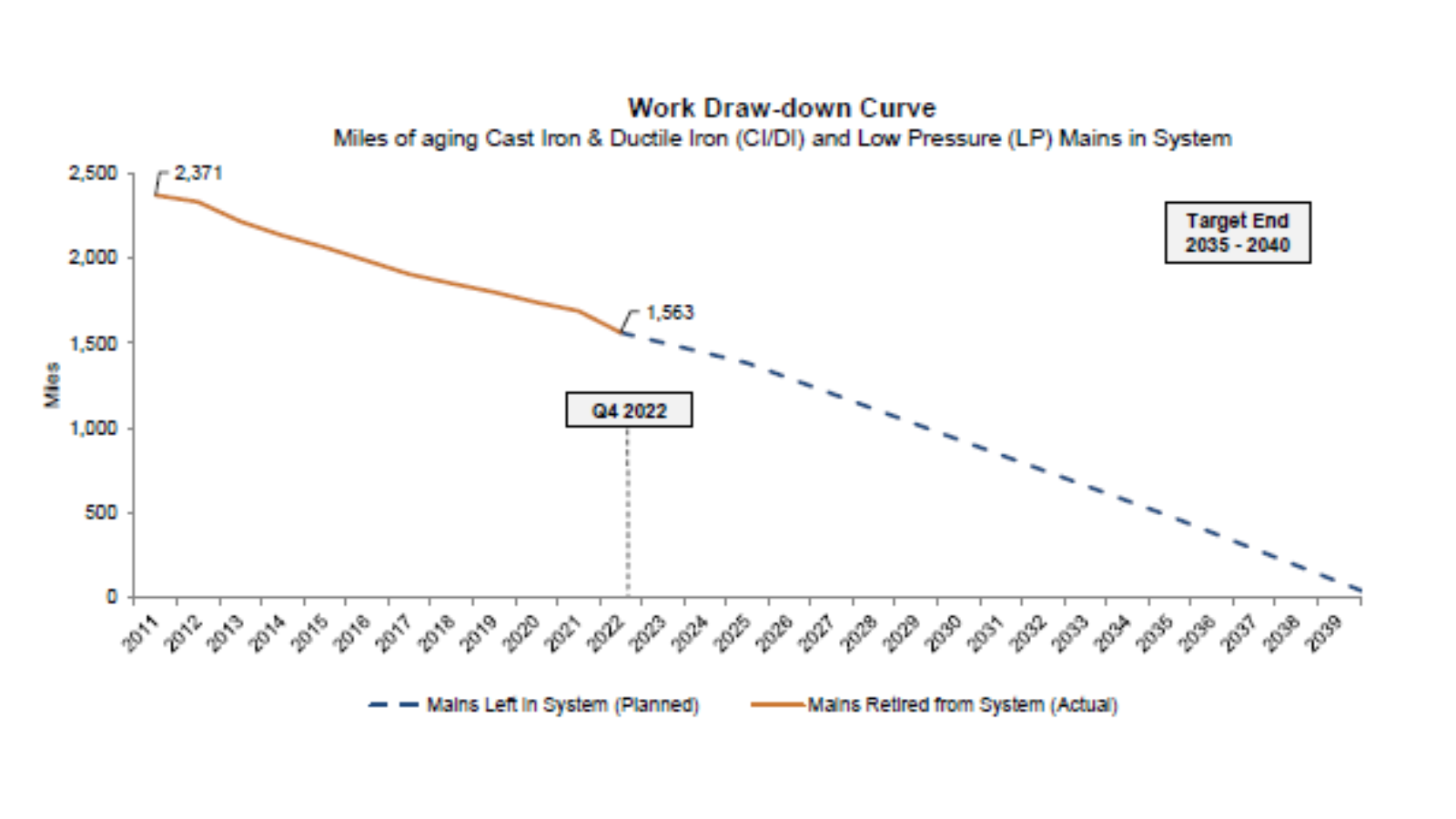
The Crain’s journalist extrapolated, again based on past performance, that the program would not be completed until 2048.
Since quarterly reporting began in 2018, the program has been consistently behind schedule and over budget
After the Commission investigation ended in 2018, Peoples Gas has submitted quarterly reports to the Commission. Over that time period, the program has been behind schedule every single quarter, and over-budget, measured by overall program cost per mile of pipe retired, every year.
The following chart shows how Peoples Gas has been behind its year-to-date replacement goals over 22 consecutive quarters.
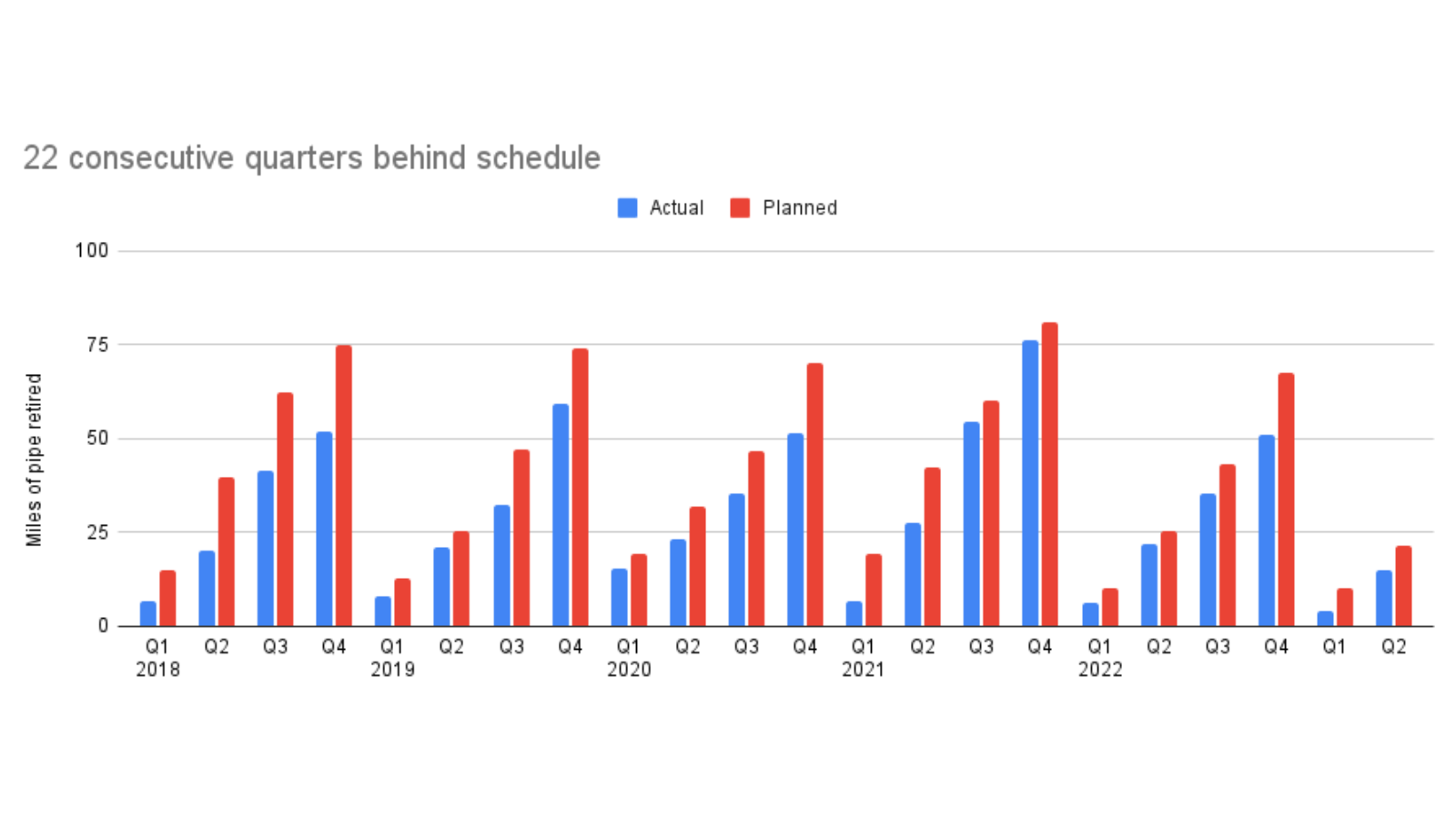
The following chart shows how Peoples Gas has been over budget, measured by overall program cost per mile of pipe retired, every year since regular reporting began and through the first half of 2023.
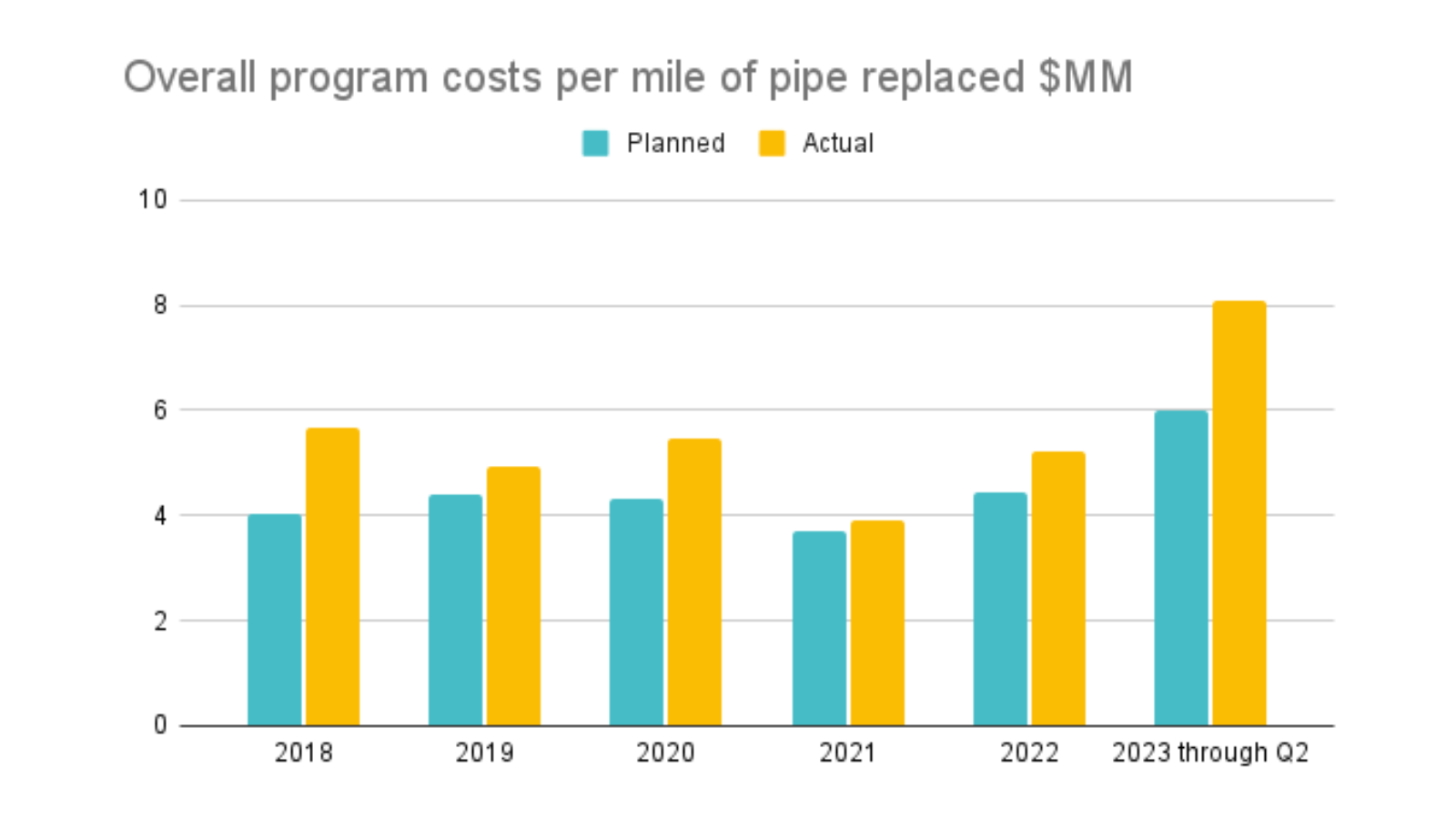
The pipe replacement program is not achieving its public safety objective
Let me be very clear: aging iron pipes in the Peoples Gas distribution system pose a safety risk to Chicago as well as a climate risk from leaking methane. It is critical that this risk be effectively mitigated. The record is clear that the Peoples Gas pipe replacement program is failing to do so.
Multiple outside reviews, starting with the 2015 Liberty audit, have found that the pipe replacement program is not reducing risk in any proportion to the billions of dollars spent. The 2020 engineering study found that “implementation of the SMP has not coincided with a noticeable reduction in pipeline failure rates – particularly during the last decade.” Note that decade encompassed the entirety of the modern accelerated pipe replacement program.
In the current rate case, an engineering expert hired by the Office of the Illinois Attorney General found that leak rates have increased over the past decade. In this quote, the expert refers to the “QIP” rather than SMP, which are equivalent in this context.
My ultimate concern on this topic is that, despite billions of dollars of investment and hundreds of miles of [leak-prone pipe] being replaced in the last 10 years, not much has improved in relation to the specific leak metrics that best describe the condition of the distribution system…Despite significant effort, the QIP has resulted in, at best, no significant net reduction in leaks and, at worst, an increase in hazardous, corrosion and material failure-type leaks across the period in which the QIP was active.Engineering expert hired by the Office of the Illinois Attorney General
This chart demonstrates that, starting at a 2013 baseline, while Peoples Gas has reduced the amount of leak-prone pipe in its system, the overall number of leaks, and the overall number of leaks related to leak-prone pipes, have both increased compared to baseline.
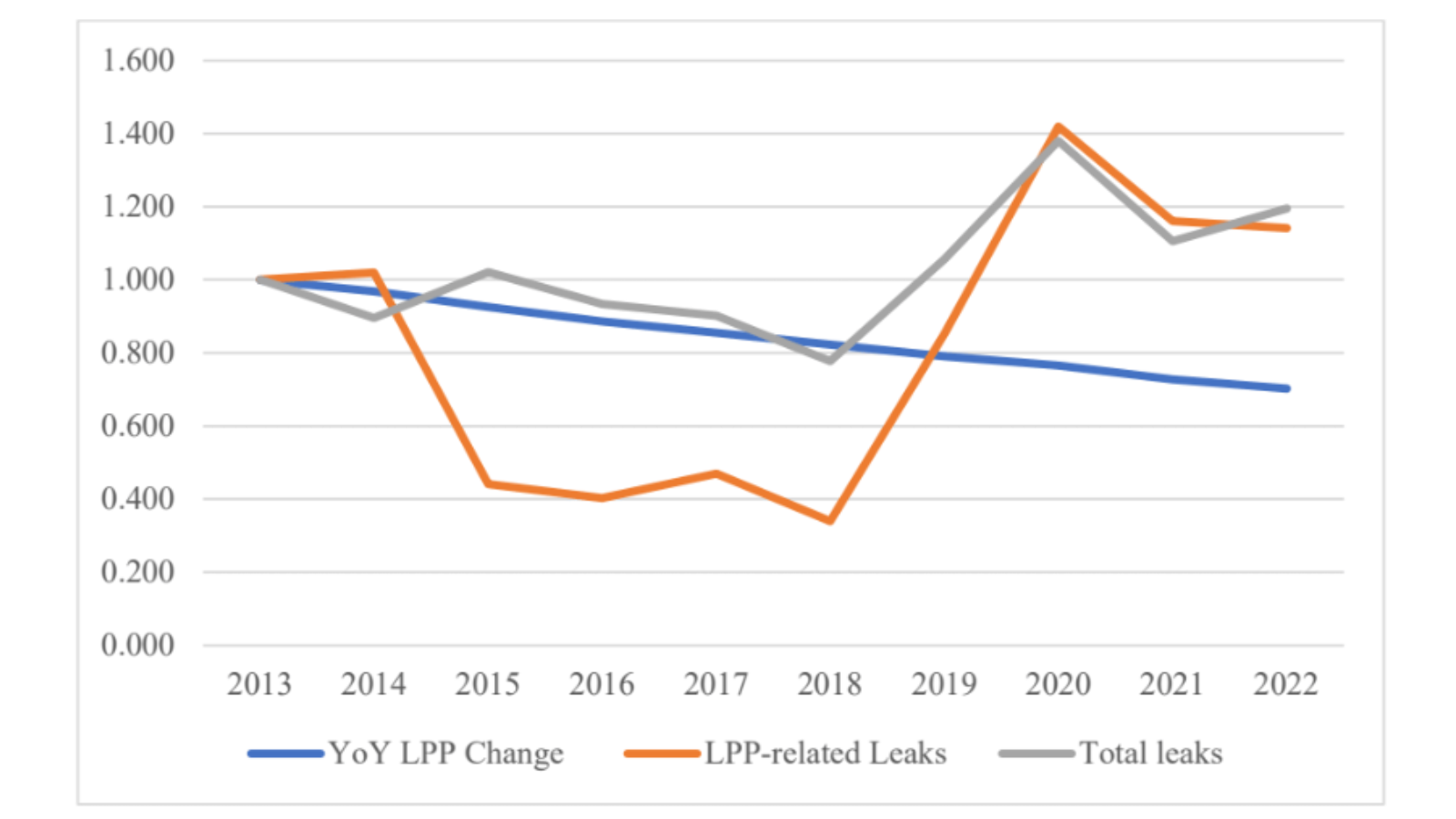
Medium pressure work dilutes the program’s focus on risk reduction
One major reason the Peoples Gas pipe replacement program is failing to achieve its risk reduction objective is that it is not designed to do so. Rather, it is designed to prioritize an overhaul to medium pressure. Upgrading to medium pressure provides some operational benefits, but has nothing to do with mitigating the specific risk posed by aging iron pipes.
One way of understanding the impact of medium pressure work is the amount of additional work it adds to the program. As an expert witness representing Public Interest Organizations in the current rate case wrote:
According to the 2022 PHMSA annual gas distribution report, Peoples Gas has 1,157 miles of cast iron and ductile iron main at the end of 2022, the pipe material Peoples Gas regularly discusses as posing a significant safety risk in its system. However, according to the Peoples Gas 2022 Q4 SMP report, the company plans to retire 1,563 more main miles through the SMP. This suggests that work unrelated to cast iron and ductile iron replacement is contributing significantly to the overall size of the program: 406 miles, or over a quarter, of the remaining main miles the Company plans to replace through the SMP are not the cast iron and ductile iron main presenting the major safety risk the SMP purports to address.
As noted above, when Peoples Gas combined at-risk pipe replacement with medium pressure work, it also changed program design from a more targeted segment approach to a zonal approach. The zonal approach is critical to medium pressure work because all pipes in any given zone of a distribution system have to be able to safely operate at the same pressure. But it also means Peoples Gas is spending time and resources replacing relatively safe low-pressure pipes while higher-risk pipes languish for years waiting for replacement.
There are multiple ways Peoples Gas could more effectively mitigate the risk of aging iron pipes in its system, including but not limited to: returning to a more targeted segment approach to replacement, repairing some pipes rather than replacing them, and targeted electrification of specific areas of the gas grid. One recommendation from the Liberty Audit that Illinois PIRG has been advocating for for years is a metric that quantifies risk reduction per dollar spent.
Conclusion
As my testimony makes clear, the failing Peoples Gas pipe replacement program is a key driver of the proposed record breaking rate hike, and will lead to future rate hikes without immediate reform. The program suffers from fatal management problems and every expert outside review has found it failing to achieve its safety risk reduction objective.
The Commission can and should initiate a new investigation of the program and take action immediately to rein the program in, which numerous parties in the case, including the Public Interest Organizations, City of Chicago, and Office of the Attorney General, have proposed.
The Commission is scheduled to make a final decision on the proposed rate hike in under two weeks. I encourage you, as representatives of thousands of Chicagoans and Peoples Gas customers, to communicate your concerns with the Commission as soon as possible.
Topics
Authors
Abe Scarr
State Director, Illinois PIRG; Energy and Utilities Program Director, PIRG
Abe Scarr is the director of Illinois PIRG and is the PIRG Energy and Utilities Program Director. He is a lead advocate in the Illinois Capitol and in the media for stronger consumer protections, utility accountability, and good government. In 2017, Abe led a coalition to pass legislation to implement automatic voter registration in Illinois, winning unanimous support in the Illinois General Assembly for the bill. He has co-authored multiple in-depth reports on Illinois utility policy and leads coalition campaigns to reform the Peoples Gas pipe replacement program. As PIRG's Energy and Utilities Program Director, Abe supports PIRG energy and utility campaigns across the country and leads the national Gas Stoves coalition. He also serves as a board member for the Consumer Federation of America. Abe lives in Chicago, where he enjoys biking, cooking and tending his garden.
Find Out More
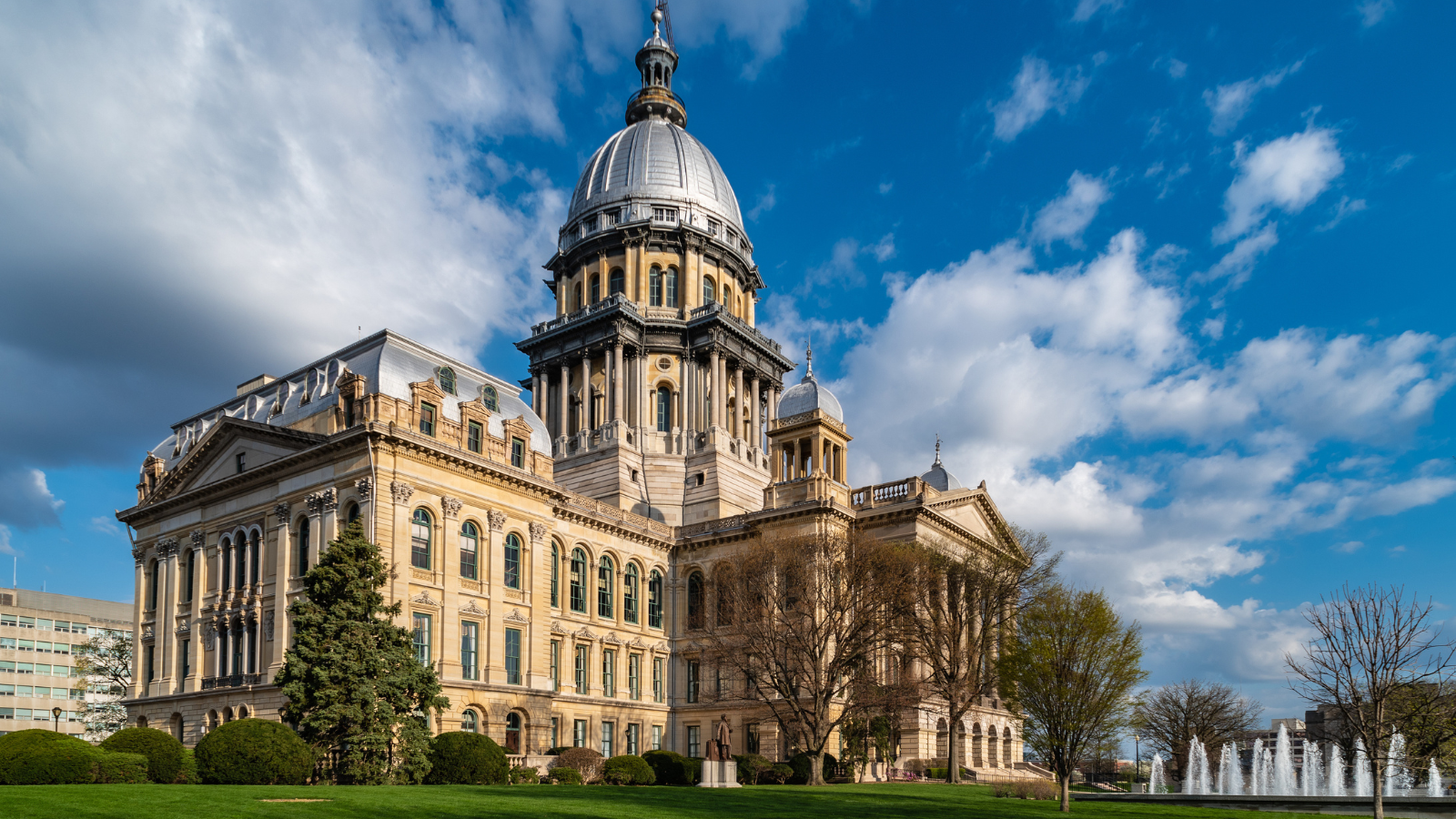
Illinois PIRG 2024 Legislative Agenda

Dry cleaner with an electric clothes dryer
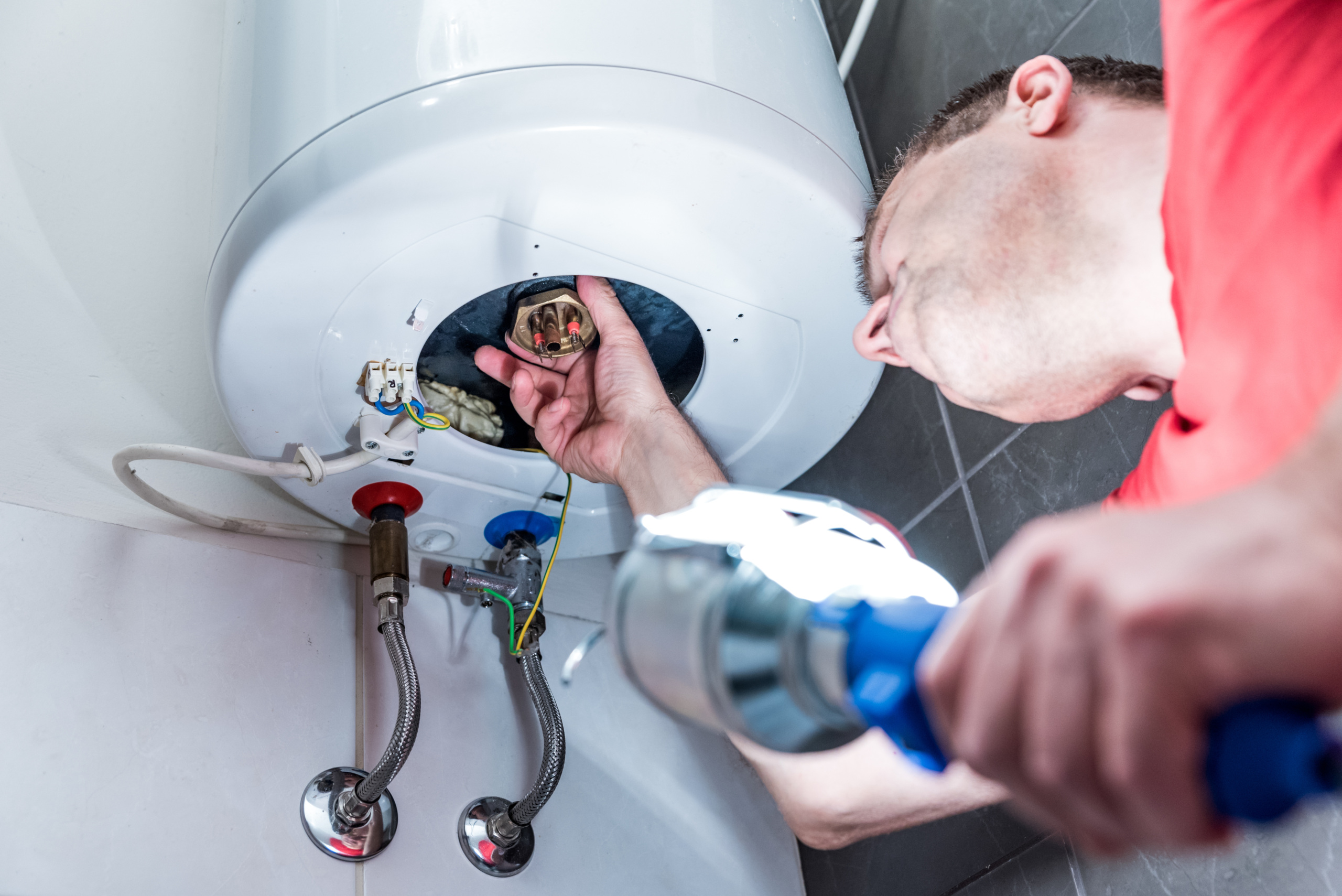
Need to replace your water heater? Consider electric
